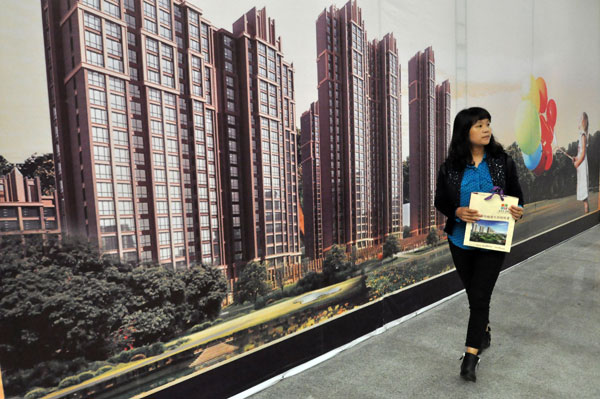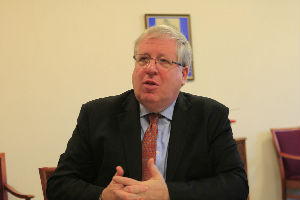Home prices rise further in Sept
Updated: 2013-10-22 23:49
By WANG YING in Shanghai (China Daily)
|
|||||||||||
Wenzhou is the only city that saw a year-on-year decline in new housing prices
|
 |
|
A potential homebuyer visits a housing event in Handan, Hebei province. Average month-on-month new home prices in Beijing, Shanghai, Guangzhou and Shenzhen rose 1.4 percent, while that of 31 second-tier cities averaged 0.7 percent, and the prices in 35 third-tier cities rose 0.6 percent. Hao Qunying / For China Daily |
Prices of new and secondhand homes continued to rise in most Chinese cities in September, led by first-tier markets and some second- and third-tier ones, according to official data released on Tuesday.
The National Bureau of Statistics reported that of the 70 major cities it tracks, 65 saw a month-on-month rise in the price of new homes in September, while prices in two other cities declined, and those in the remaining three were flat.
The data cover mid-sized and large cities, including Beijing, Shanghai and provincial capitals.
Luzhou, a city in the southwestern province of Sichuan, showed the largest monthly gain, with prices up 1.9 percent, the NBS said.
On a year-on-year basis, Wenzhou in Zhejiang province was the only city to show a decline, with new home prices down 1.8 percent.
Beijing, Shanghai, Guangzhou and Shenzhen had the largest year-on-year increases, with gains of 20.6 percent, 20.4 percent, 20.2 percent and 20.1 percent, respectively.
The increased prices were a direct outcome of high transaction volumes, which surged in the traditional peak season of September after slowing in July and August.
Housing sales reached 1.4 million square meters in Shanghai, up 59 percent month-on-month and 77 percent year-on-year, as first-time homebuyers and upgraders returned to the market, according to research from Jones Lang LaSalle.
Analysts also suggested that the large year-on-year increases reflected a low base of comparison.
Housing prices have continuously risen since last October, noted Liu Jianwei, a senior statistician with the NBS.
Liu added that the price decline in September 2012 was the direct cause of the year-on-year surge for the same month this year.
New home prices edged down 0.7 percent in Beijing in September 2012, while in Shanghai the figure was 1.9 percent. The decline was 0.7 percent in Guangzhou and 2.2 percent in Shenzhen.
Another 51 cities experienced a year-on-year price decline in September 2012, which worked out to 1.8 percent for the group as a whole.
Liu said that price trends are diverging among cities. He said that the largest increases are mainly taking place in first-tier cities and several second- and third-tier cities, with prices in the rest of the cities increasing at a moderate pace.
Average month-on-month new home price rises in Beijing, Shanghai, Guangzhou and Shenzhen reached 1.4 percent.
The average for the 31 second-tier cities covered by the NBS was 0.7 percent, while for the 35 third-tier cities, the figure was 0.6 percent.
Analysts said the market will cool off.
"Especially in the secondary market, home prices are well above the reach of ordinary buyers at the moment. The growing difficulties in obtaining mortgages at the end of the year will also make buyers hesitant to conclude a deal," said Lu Qilin, research director at Shanghai Deovolente Realty.
Most analysts believe it is unlikely that the central government will announce any further tightening policies involving the real estate market in the foreseeable future.
Runaway prices led the government to issue guidelines in March to further tighten control of the real estate sector, including higher transaction taxes, restrictions on purchases of multiple homes and higher down payments. But the guidelines failed to arrest the surge.
The government is likely to expand its property tax trials amid recent gains in home prices in many cities, according to experts.
Government documents on reform have repeatedly touched on the subject, further evidence that this approach is locked in, said Jia Kang, head of the Research Institute of Fiscal Science at the Ministry of Finance.
But Ding Zuyu, executive president of E-House (China) Holdings Ltd, said that it’s unlikely to see the governments of first- and second-tier cities will achieve their goals of reining in prices. As a result, these cities are likely to announce separate measures.
"It is becoming clearer that the former administrative-oriented policy is going to be replaced by a market-oriented system, and the central government aims to set up a long-term mechanism for building a healthier property market," said Ding.
Related Stories
China's home prices continue to rise 2013-10-22 10:12
Polarized home price predictions confuse buyers 2013-10-07 13:28
China's home prices continue to rise in August 2013-09-18 10:53
Home prices continue to rise in July 2013-08-19 09:46
Home price rises in most Chinese cities slow in July 2013-08-19 07:55
Home price rebounds create paradox for policies 2013-08-15 16:00
Today's Top News
China, Russia reach big oil deal
Apple unveils new Macs, iPad
Top officials promote power relations
Home prices rise further in Sept
Big challenges lie ahead for urban planners
Firms urged to contact unions abroad
Smart cities to aid urbanization
UN films highlight rise in HIV cases among women
Hot Topics
Lunar probe , China growth forecasts, Emission rules get tougher, China seen through 'colored lens', International board,
Editor's Picks

|

|

|

|

|

|





